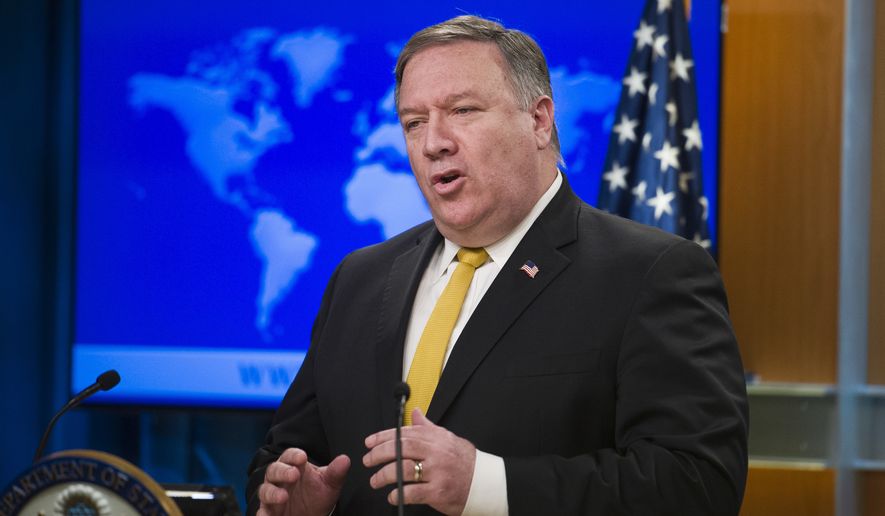The Trump administration is pulling out of an “obsolete” 63-year-old friendship treaty with Iran, Secretary of State Mike Pompeo announced Wednesday, just hours after an international tribunal ruled the U.S. government must roll back some of the economic sanctions it has imposed on Tehran over its nuclear and missile programs.
Mr. Pompeo appeared in the State Department briefing room to personally deliver the news, calling the termination of the 1955 agreement “overdue” and accusing Iran of abusing the International Court of Justice in The Hague to undercut U.S. policy.
Iran cited the 1955 agreement as the basis for arguing at the ICJ that curbs on humanitarian trade announced by the Trump administration after President Trump pulled out of the 2015 Iran nuclear deal this spring were illegal under international law.
In a preliminary ruling, the court said that Washington must remove “any impediments arising from” the re-imposition of sanctions to the export to Iran of medicine and medical devices, food and agricultural commodities and spare parts and equipment necessary to ensure the safety of civil aviation.
Mr. Pompeo noted that the court refused to grant Iran much more sweeping relief from U.S. sanctions that Tehran had demanded. He also said the U.S. sanctions policy already took into account exceptions for humanitarian transactions with Iran, and accused the regime in Tehran of spending money on military adventures abroad rather than on the needs of its own citizens.
Iran’s Foreign Minister Mohammad Javad Zarif praised the court ruling on Twitter, calling it “another failure for sanctions-addicted” U.S. and a “victory for rule of law.”
National Security Adviser John R. Bolton made his own surprise appearance at the White House press briefing to amplify the U.S. case against both Iran and international bodies such as the ICJ.
Mr. Bolton announced Wednesday that the administration had blocked a legal challenge lodged at the ICJ to its decision to move the U.S. embassy to Jerusalem, calling the case a political stunt by “the so-called state of Palestine.”
In May, the Palestinian Authority filed a complaint with the U.N. tribunal, challenging the administration’s move of the embassy to a city that Palestinians want to become their capital.
To stop the suit, Mr. Bolton said the U.S. would withdraw from an optional provision of the Vienna Convention on dispute resolution.
“We will commence a review of all international agreements that may still expose the United States to purported binding jurisdiction dispute resolution in the International Court of Justice,” he told reporters. “The United States will not sit idly by as baseless politicized claims are brought against us.”
The little-known 1955 “Treaty of Amity” with Iran was many signed after World War II as the U.S. tried to assemble a Cold War coalition of nations to counter the Soviet Union. Like many of the treaties, this one was aimed at encouraging closer economic relations and regulating diplomatic and consular ties.
Jamal Abdi, president of the National Iranian American Council, accused the Trump administration of acting “impetuously” in abrogating the accord, even given the current hostility between Washington and Tehran.
“That treaty has proven immensely valuable to the United States historically, including in the judgment against Iran over the 1979 hostage crisis,” Mr. Abdi said in a statement.
Mr. Pompeo said it remained to be seen what the practical effect of abrogating the deal would be. He said Iran has been “ignoring” the agreement for a long time, and the ICJ ruling provided just one more justification for ending the accord.
Mr. Pompeo also told reporters he was “optimistic” ahead of his trip to Pyongyang this weekend for a new round of talks with North Korea on ending its nuclear programs. He said he hopes the meeting will not only set up a second summit between Mr. Trump and North Korean leader Kim Jong-un but also give both sides a “better understanding” of the pathway to total denuclearization.
• Dave Boyer can be reached at dboyer@washingtontimes.com.
• David R. Sands can be reached at dsands@washingtontimes.com.




Please read our comment policy before commenting.